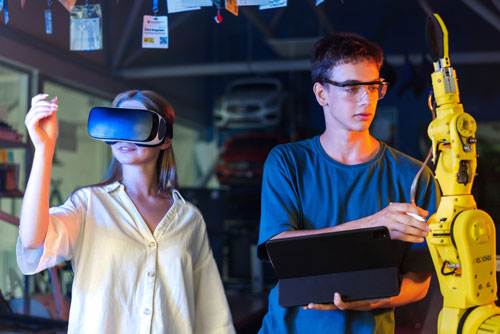Artificial Intelligence (AI) is transforming industries at an unprecedented rate, promising efficiencies and innovations that were once thought impossible. Yet, with this progress comes a critical concern: what impact will AI have on the job market of the future? While AI offers many opportunities, it also presents challenges to traditional employment models. Understanding how this technology will shape the future of work is essential for both individuals and businesses.
Automation and Job Displacement
One of the most talked-about effects of AI is automation. AI systems are now capable of performing tasks that were previously reserved for human workers. From manufacturing to data entry, many routine and repetitive jobs are being automated. For example, AI-powered machines can now operate assembly lines, conduct basic customer service interactions, and even analyze financial reports. According to a report by the World Economic Forum, AI could potentially displace 85 million jobs by 2025.
However, it’s important to note that while some jobs will be replaced, others will evolve. AI won’t just eliminate jobs—it will transform them. The key challenge is how to reskill workers in fields vulnerable to automation so that they can thrive in an AI-augmented workforce.
Emergence of New Job Roles
On the flip side, AI is also creating new job opportunities. The rise of AI means that there will be an increasing demand for roles related to AI development, maintenance, and ethical oversight. These include AI specialists, data scientists, machine learning engineers, and AI ethicists. Additionally, industries like healthcare, education, and creative fields are likely to see growth in AI-assisted roles.
For instance, healthcare professionals can leverage AI for diagnostics, allowing doctors to focus on patient care rather than paperwork. In education, AI tutors can personalize learning experiences, but human teachers will remain essential to provide emotional and social learning support. Creative industries, such as marketing or content creation, will rely on AI to assist in tasks like data analysis and customer targeting, but the need for human creativity will remain vital.
Reskilling and Lifelong Learning
As AI reshapes the job market, one of the most pressing needs will be for reskilling and continuous learning. In many cases, workers in automated roles will need to acquire new skills to remain relevant in the workforce. Governments, educational institutions, and businesses will need to collaborate to offer upskilling programs that prepare individuals for new, AI-enhanced jobs. A focus on STEM (Science, Technology, Engineering, and Mathematics) education, alongside soft skills like problem-solving and adaptability, will be crucial.
Additionally, lifelong learning will become the norm. With the rapid pace of AI advancements, workers will need to constantly upgrade their skills to keep pace with new technologies. This shift will require a cultural change in how we view education, moving from the traditional model of a finite period of schooling to a continuous cycle of learning throughout one’s career.
The Human Touch: Irreplaceable Skills
While AI can take over repetitive tasks and analyze vast amounts of data, there are certain skills that remain uniquely human. Emotional intelligence, creativity, critical thinking, and complex problem-solving are areas where AI, despite its capabilities, struggles to replicate human nuance. Jobs that require empathy, social interaction, and ethical judgment will continue to be dominated by humans, as these are areas where machines still fall short.
AI may excel at diagnosing diseases based on symptoms, but the compassion and understanding that a human doctor brings cannot be replaced by a machine. Similarly, while AI can generate content or assist in decision-making, it lacks the ability to craft a compelling story or navigate complex moral dilemmas. These human-centric skills will continue to be in high demand in an AI-driven world.
The Gig Economy and Remote Work
AI is also reshaping how we think about work. The gig economy and the rise of remote work are trends that have been accelerated by technological advancements, including AI. Platforms powered by AI algorithms are now matching freelancers with job opportunities in real-time, further fueling the gig economy. As AI optimizes the management of workforces, companies can operate with greater flexibility, enabling more remote work arrangements.
However, this trend also raises concerns about job security, benefits, and worker rights. The gig economy can offer flexibility, but it often lacks the protections and stability of traditional full-time employment. As AI-driven platforms become more prevalent, it will be important to create policies that ensure fair treatment and compensation for workers in these emerging sectors.
Ethical Considerations and the Future of Work
The integration of AI into the workforce also brings significant ethical considerations. As AI becomes more pervasive, issues like bias in AI algorithms, data privacy, and the socioeconomic divide between those with access to AI technologies and those without must be addressed. AI can inadvertently perpetuate existing inequalities if not carefully managed.
Businesses and governments will need to prioritize ethical AI development and implement regulations that protect workers’ rights and ensure fair access to opportunities. Collaboration between AI developers, policymakers, and workers will be crucial to building a future where AI augments rather than exploits the workforce.
Conclusion
The future of jobs in an AI-driven world is both exciting and uncertain. While AI will undoubtedly disrupt many traditional job roles, it will also create new opportunities and industries. The key to thriving in this new landscape will be adaptability, a commitment to lifelong learning, and a focus on the uniquely human skills that machines cannot replicate.
In this rapidly changing environment, individuals, businesses, and policymakers must work together to ensure that AI serves as a tool for progress, rather than a force for displacement. By embracing the changes that AI brings and investing in human potential, we can build a future where technology and people work in harmony, creating a more innovative, efficient, and equitable world.

